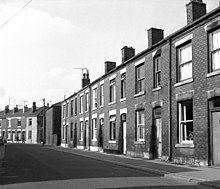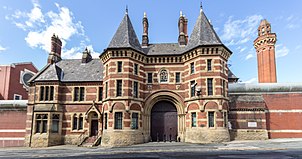Robert Roberts (writer)
Born and raised above his parents' corner shop in a deprived district of Salford, Roberts left school at 14 to undertake a seven-year apprenticeship as a brass finisher.
Roberts inherited his mother's love of reading and socialist politics; while he spent the next three years unemployed, he attended evening classes to study foreign languages and social history.
This led to the conurbation's rapid expansion, but it also brought poverty as the often poorly paid workers were accommodated in small, densely crowded and unsanitary housing.
[2] Friedrich Engels was one of many social observers who commented on this;[3] his description of Salford in The Condition of the Working Class in England (1845) highlighted the terrible state of the districts where the workers lived: Whoever passes over this viaduct and looks down, sees filth and wretchedness enough; and, if any one takes the trouble to pass through these lanes, and glance through the open doors and windows into the houses and cellars, he can convince himself afresh with every step that the workers of Salford live in dwellings in which cleanliness and comfort are impossible.
[4]Salford's economy had diversified by the time Roberts was born; cotton was still important, though engineering had become a key employer and other manufacturing industries had emerged.
[1] His son described him as "firmly embedded in the working class", a "formidable figure in our neighbourhood ... a fair, handsome man, violent in drink and, when sober, eloquent after a loud-mouthed Celtic fashion".
[12] Jennie ran the business, but the elder Robert's work as an engineer was punctuated by periods of unemployment; this combined with the shop's limited takings (in such a poor area) and his heavy drinking to keep the family tied to their neighbourhood for decades.
[1] According to Roberts, he wanted to remain in education, but the school's curriculum did not cover the subjects needed to obtain a bursary to study at the local technical college.
[24] Roberts's apprenticeship consisted of his repeating mundane tasks for eight and a half hours every day: Tich led me to a small contraption by a window, pulled a lever to put wheels in motion, tightened a union nut on a pedestal, and ran both, by ratchet, through a couple of whirring butterfly cutters.
... Over the next two years, in between brushing the alleys and brewing thirty cans of tea each morning, I performed this simplest of tasks for eight and a half hours every working day.
He attended evening classes to learn French and study social history and English literature, and in 1927 founded the Salford Esperanto Society.
[31] He remained involved in the labour movement and became an internationalist, serving for a time as president of the Manchester Workers' International Club and opposing fascism in Europe (he paid visits to the continent to speak publicly on the topic).
Published in 1968 by Manchester University Press, it offered an account of his experiences teaching illiterate and poorly literate prisoners to read and write.
In the opening chapter, he explains that "since little seems to have been written about teaching the illiterate and educationally backward in gaol, I have tried to set down an account of my own experience in the hope that it might be useful to tutors and others coming new to the prison service".
[36] Roberts advocated a learning programme in which beginners entered a small class and progressed to larger group sessions once they had mastered the basics.
[40] By contrast, John Gunn (in The British Journal of Psychiatry) thought the book fell short of its aim to examine the sociology of the prison because of its limited "form": in his view, its themes were undeveloped, its structure arbitrary and the long quotes distracting.
[1] In the preface, Roberts explains that he wrote the book because descriptions of working-class life in the period "naturally lacked the factuality that first-hand experience might have given it; few historians are the sons of labourers".
[45] Three appendices each contained a short story: "Conducted Tour" narrated two children exploring their environment, "Snuffy" was about a boy in a library, and "Bronzed Mushrooms" followed a brass worker in the mid-1880s.
[54] In the journal Sociology, Campbell Balfour called the book "unusual, interesting, and highly readable" and argued that "as a descriptive study of lower working class life it can have few equals".
[55] Writing in The British Journal of Sociology, Peter Marris was impressed by the "brilliant evocation" Roberts provided of the Salford of his youth and thought the short stories at the end were "masterpieces" if "awkwardly labelled".
[58] Though praising its evidentiary value and insights into slum life, P. J. Waller (in the journal History) also critiqued Roberts's limited referencing, and felt that the weaker points of the book occurred where he engaged with academic debates.
[59] Writing in The Oxford Dictionary of National Biography, the historian Andrew Davies described The Classic Slum as Roberts's "most influential book".
[63] Roberts was writing in opposition to post-war sociologists who emphasised positive features of communities like his;[1] he asserted that "close propinquity, together with cultural poverty, led as much to enmity as it did to friendship".
[78] Whereas outside observers (including sympathetic ones like Engels and George Orwell) often depicted the working class as both passive and dirty, Roberts emphasised their constant striving to keep clean, which stemmed from their desire for respectability.
[79] Schmid has also argued that Roberts expressed some nostalgia for a "pure" form of English working class culture, which had become Americanised by the time he wrote the book.
[80] Roberts's third and final book was his autobiography A Ragged Schooling: Growing up in the Classic Slum,[1] published by Manchester University Press in 1976 and reprinted in paperback by Fontana in 1978.
Chapters 15 focused on the First World War and was followed by accounts of Roberts's schooling, apprenticeship, working conditions and trade unionism, and his self-guided education.
Writing for The Observer, Paul Bailey called it a "memoir of quite extraordinary richness"; he found parts of it moving and others funny, and thought it just as good as The Classic Slum.
[82] In a review for the Birmingham Daily Post, Roy Palmer commended the "splendid book, full of humour, life, compassion and humanity"; he praised the "sheer strength and depth of writing" and found the imagery evocative.



